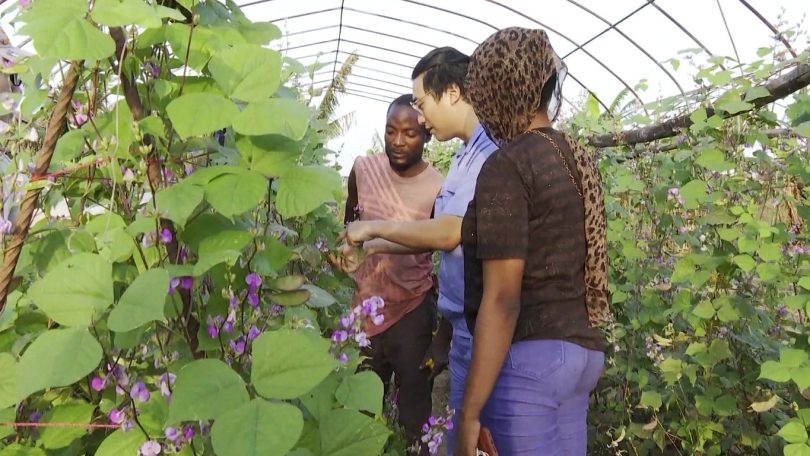Supporting agricultural development and food security has always been a key focus of the cooperation between China and the more than 50 African countries with which China has established diplomatic relations.
Burkina Faso in West Africa has also reaped numerous tangible benefits from the wide ranges of cooperation during the six years after it severed ties with Taiwan and resumed diplomatic relations with Beijing.
After the resumption of diplomatic ties in May 2018, the then President of Burkina Faso Roch Marc Christian Kabore attended the Beijing Summit of the Forum on China-Africa Cooperation in September.
The normalization of bilateral ties marked Burkina Faso’s entry into the big family of China-Africa cooperation, with its agricultural sector poised for fundamental changes.
In July 2018, a Chinese agriculturist team arrived to help the Western African country improve agricultural conditions and upgrade planting technologies.
Through sustained and unremitting efforts, the two sides have made significant achievements in agricultural cooperation.
A priority in the cooperation was to address Burkina Faso’s most pressing food security issues based on its specific needs. China has been focusing on fundamentally enhancing the country’s food production capacity. It dispatched expert teams, provided technical expertise, conducted talent training, and also provided agricultural supplies such as seeds, pesticides, fertilizers and agricultural machinery.
Rice production
With the increase in population and improvement in people’s living standards, Burkina Faso’s demand for rice has been constantly growing, but the country’s rice production can’t meet the needs.
The Chinese expert teams dispatched by the Chinese government conducted numerous experiments related to rice seed, mechanical operations and other aspects of cultivation, aiming to discover methods suitable for local rice production.
With extensive research and experiments, Chinese experts successfully introduced Chinese hybrid rice to Burkina Faso. The Chinese hybrid rice can not only increase yields per hectare by several times but also shorten growth cycles and produce rice grains with better taste and stronger disease resistance.
The country used to spend over 16 million U.S. dollars annually on rice imports. With the introduction of hybrid rice from China, grain production has significantly increased, alleviating its heavy reliance on imported rice.
In addition to seeds and planting techniques, China has been providing fertilizers, agricultural machinery and technical support throughout the entire process of planting and harvesting, as well as training local agricultural officials, technicians and farmers.
The locally applicable mechanization development models developed by Chinese experts have helped local villagers significantly decrease their input, such as labor intensity while increasing their output and incomes.
Millet production
Chinese expert teams have been assisting local farmers in introducing advanced millet cultivation techniques and improving varieties in recent years, significantly increasing millet crop yields and boosting local farmers’ incomes.
Before 2019, in Burkina Faso, millet yields were very low due to their outdated and unscientific planting methods. In April 2019, the Chinese-assisted millet planting demonstration project in Burkina Faso began implementation, with the “Zhang Hybrid Millet” planting project taking the center stage. Chinese experts and management teams used machines for the planting, which was 6 to 7 times more efficient than manual planting. The team also adopted ridging of the land, resulting in better water retention.
The three-year millet planting demonstration project saw millet breeding bases constructed and a system for breeding and demonstrating high-quality millet established. Over the three-year period, the average millet yield in the country increased from 0.65 tonne per hectare to 0.82 tonne per hectare, helping the country increase millet production by 200,000 tonnes.
In August 2023, four varieties of the “Zhang Hybrid Millet” series were approved in Burkina Faso, paving the way for the Chinese variety to further benefit this west African country.
Education and training programs
Various agricultural training courses have been held in the two countries with scholarships established to support African students studying in China. Platforms dedicated to agricultural technology exchange, demonstration and training have been set up in China to systematically transfer agricultural knowledge and technology to African technicians and officials. So far tens of thousands of Africans have benefited, including quite a few from Burkina Faso. With the knowledge and skills learned, they have been guiding villagers in millet cultivation in their hometowns.
In addition to supporting Burkina Faso in boosting food production, China has delivered more than 5,000 tons of rice to the country and plans to provide emergency humanitarian food aid to 170,000 internally displaced people. China has also been facilitating bilateral trade. Since December 1st, 2022, 98% of Burkina Faso’s exports to China have enjoyed zero tariff.
Burkina Faso still faces multiple challenges in agricultural development, such as limited funding, inadequate infrastructure and equipment, and outdated production methods. China and Burkina Faso can build on the past achievements and further explore new paths of agricultural cooperation to help the latter achieve a stronger guarantee for food security.
They could deepen bilateral agricultural cooperation within the framework of the Forum on China-Africa Cooperation and maximize the role of forums such as the Forum on China-Africa Cooperation in Agriculture.
More Chinese companies from various sectors should be encouraged and supported to participate in the formation of the entire industry chain in Burkina Faso and assist the country in developing its distinctive agricultural industries.
Burkina Faso may further leverage China’s experience and advantages in agricultural machinery automation and technological levels to improve the efficiency and quality of food production.
The two sides can also expand the market for Burkina Faso’s agricultural products through digital cooperation such as e-commerce.
China has signed agricultural cooperation memorandum of understanding or protocols with nearly 20 African countries, established agricultural technology demonstration centers in over 20 African countries and dispatched nearly a hundred expert teams to almost 40 African countries.
Meanwhile, China has announced plans to implement 50 agricultural aid projects in collaboration with Africa, dispatch 500 senior agricultural experts and support Africa in achieving food security by 2030.
With the concrete plans laid out and the commitment to jointly building a China-Africa community with a shared future, there is every reason to believe the prospects of agricultural cooperation between China and Burkina Faso will be even brighter.
story by: Zhou Fang(CGTN)












Leave a Comment
You must be logged in to post a comment.